Gallup Polls over the past several months have shown consistent majority support for an invasion of Iraq among most segments of American society. While there are major differences in support among partisan groups, there are relatively modest differences by age, gender, and income. But a sizable gap between people with postgraduate education (representing about one in seven Americans) and everyone else raises interesting questions about the relationship between education and conflict management. One curious feature of this "education gap" is that it hardly exists among Republicans, who express widespread support for the war virtually regardless of education, but it is quite prominent among both Democrats and independents.
Demographic Differences in Support for War in Iraq
The most visible differences among Americans in their support for a possible invasion of Iraq are found among partisan groups, with Democrats expressing majority opposition, independents bare majority support, and Republicans strong majority support.
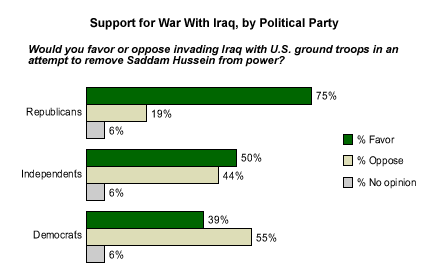
Support for the war is fairly consistent among income groups, all of which contain majorities in support of war by a minimum margin of 11 points. Nor are there major gender or generational gaps in Americans' support for the war. While women's support is somewhat lower than men's, majority support is found in both groups. Similarly, there are some modest differences by age groups, with younger people more in favor than older people. Still, majorities in the three age groups under the age of 65 express support, while people aged 65 and older are about evenly divided.
The Education Gap
There is, however, a significant education gap -- with a majority of the most highly educated group of Americans clearly opposed to war, while an equally clear majority of the rest of Americans are in favor.
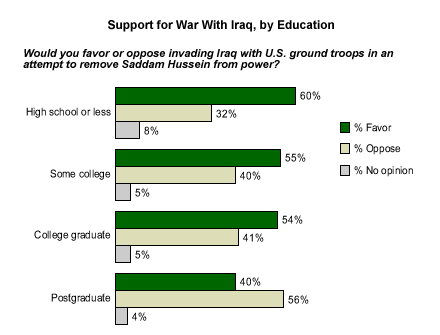
There is a modest decline in war support as educational levels increase from high school or less, to some college, to college graduate (with no postgraduate education). However, the largest gap occurs at the highest level, between those with a postgraduate education and those without. Only among the postgraduate group is the majority opposed to war, 56% to 40%, while the other three categories all show majority support.
Education Gap Related to Partisan Orientation
One of the intriguing findings is that the education gap does not occur uniformly among the partisan groups. Among Republicans, in fact, education appears to have little or no relationship to attitudes about the war.
More than 7 in 10 Republicans at each level of education support the war, with the highest found among the college grads (79%) and the lowest among the postgraduates (71%). But there is no linear trend, as 76% of Republicans in the high school education category express support, compared with 73% in the "some college" group. These small differences among categories appear to be random fluctuations, rather than a pattern associated with levels of education.
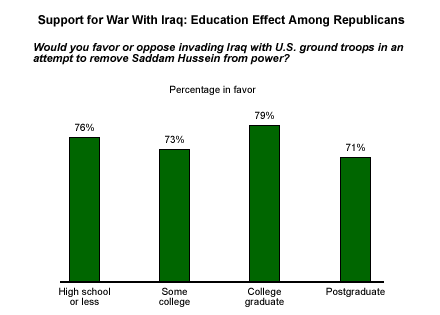
Among independents, education is highly related to support for the war. Those with only a high school education give clear majority support, but support declines as educational level increases.
The biggest drop occurs between independents in the two highest educational categories. Forty-seven percent of independents who are college grads support the war, but only 34% of those with postgraduate training express support.
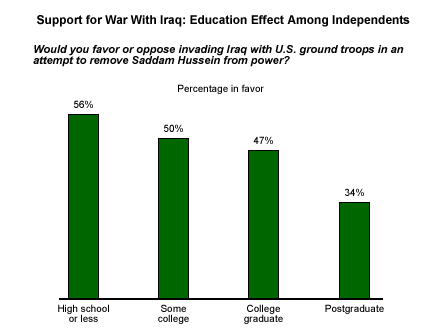
The relationship between education and war support is even stronger among Democrats. Overall, there is a drop of 35 percentage points in support between the lowest educational category and the highest. While those with a high school education express bare majority support (51%), only 38% of Democrats with some college favor the war. Support drops to 31% among college grads, and then plummets to just 16% among postgraduate Democrats.
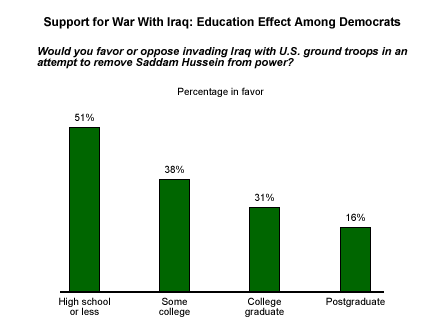
Bottom Line
The relationship between education and war support is quite strong among independents and Democrats, but weak among Republicans. Perhaps this difference is related to the fact that the Republicans can look to one person, President Bush, for an indication of their party's position, while leadership for independents and Democrats is more decentralized, and thus perhaps less clear. In this situation, the underlying tendency for more educated people to oppose war may be more likely to come into play.
Despite the differences by party, the general conclusion remains: the more formal education people have, the more likely they are to oppose war with Iraq. Whether this is a response that applies just to this war and this country, or more generally to people around the world in other war situations, is well worth pondering. Would more education for people around the world lead to fewer conflicts? Or is the educational effect observed here an idiosyncratic response of some Americans to this particular war? Answers to these questions are not trivial.
*Results are based on a composite of six separate Gallup Polls, each with about 1,000 national adults, aged 18 and older, conducted in December 2002, and January and February 2003. For results based on the total sample of 6,027 national adults, one can say with 95% confidence that the maximum margin of sampling error is ±1%. The sample includes 1,239 respondents who indicate they have received postgraduate training. The margin of error for this group is ±3%.
In addition to sampling error, question wording and practical difficulties in conducting surveys can introduce error or bias into the findings of public opinion polls.